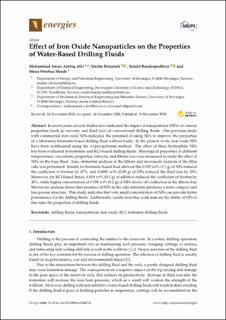Effect of Iron Oxide Nanoparticles on the Properties of Water-Based Drilling Fluids
Peer reviewed, Journal article
Published version

Åpne
Permanent lenke
https://hdl.handle.net/11250/2726856Utgivelsesdato
2020Metadata
Vis full innførselSamlinger
Sammendrag
In recent years, several studies have indicated the impact of nanoparticles (NPs) on various properties (such as viscosity and fluid loss) of conventional drilling fluids. Our previous study with commercial iron oxide NPs indicated the potential of using NPs to improve the properties of a laboratory bentonite-based drilling fluid without barite. In the present work, iron oxide NPs have been synthesized using the co-precipitation method. The effect of these hydrophilic NPs has been evaluated in bentonite and KCl-based drilling fluids. Rheological properties at different temperatures, viscoelastic properties, lubricity, and filtrate loss were measured to study the effect of NPs on the base fluid. Also, elemental analysis of the filtrate and microscale analysis of the filter cake was performed. Results for bentonite-based fluid showed that 0.019 wt% (0.1 g) of NPs reduced the coefficient of friction by 47%, and 0.0095 wt% (0.05 g) of NPs reduced the fluid loss by 20%. Moreover, for KCl-based fluids, 0.019 wt% (0.1 g) of additive reduced the coefficient of friction by 45%, while higher concentration of 0.038 wt% (0.2 g) of NPs shows 14% reduction in the filtrate loss. Microscale analysis shows that presence of NPs in the cake structure produces a more compact and less porous structure. This study indicates that very small concentration of NPs can provide better performance for the drilling fluids. Additionally, results from this work indicate the ability of NPs to fine-tune the properties of drilling fluids.
